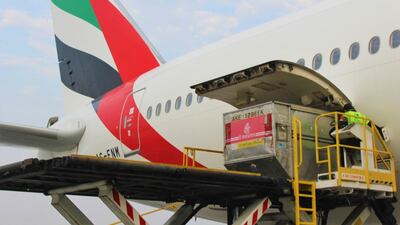A third shipment of aid marked for Beirut left Dubai International Airport on Saturday to assist the Lebanese people in their recovery from an explosion that devastated the country's capital this month.
Two Emirates SkyCargo aircraft were loaded with 30 tonnes of aid at Dubai's International Humanitarian City. The aid included 12 tonnes of medical supplies from the World Health Organisation and 18 tonnes of hygiene kits from the International Federation of Red Cross and Red Crescent Societies.
Almost 180 people died and 6,000 were injured in an enormous twin explosion, heard as far away as Cyprus, at Beirut Port on August 4.
The blast collapsed buildings and shattered windows tens of kilometres away, causing an estimated $20 billion in damages, according to a report by Strategy&.
The report said 150,000 people in Beirut are currently in need of immediate humanitarian assistance as a result of the explosion. 15,000 tonnes of wheat were destroyed in the blast and 500 extra hospital beds are needed to make up for the lost capacity at damaged hospitals, it said. Also, 27 containers of medical equipment, including PPE, have been destroyed. Lebanon imports 85 per cent of its food and even before the explosion half of Lebanese were worried about a lack of food amid the financial crisis. Some 300,000 are being offered food assistance by the United Nations with the majority of the populations of the Beirut areas most affected by the blast in need of help.
The international response was immediate with leaders from around the world offering Lebanon assistance, including the UAE, which established an air bridge to facilitate the delivery of vital supplies.
Giuseppe Saba, chief executive of the IHC, said the hub would continue to support relief efforts to Lebanon.
"These flights also represent a combination of the efforts of IHC and Emirates SkyCargo, which is facilitating this transport, and reflect Dubai’s keenness to support relief efforts for our brothers and sisters in need," he said.
Robert Blanchard, from WHO’s logistics hub in Dubai, said the organisation was sending additional medical supplies to help treat the injured and protect health care workers.
"The 11.5 tons of medical supplies, which went in the first flight, include trauma and surgical supply kits donated by the Russian Government as well as 576,000 surgical masks and hand sanitisers to protect healthcare workers from Covid-19.
"Today’s flight is the third charter flight carrying WHO medical supplies to Beirut."
The second flight was loaded with nearly 65 cubic metres of hygiene parcels, supplied from the IFRC.
"The hygiene parcels will provide essential assistance and support to some 2,000 families affected by the Beirut port explosions," said Ilir Caushaj, head of IFRC’s Global Fleet and Logistics Hub in Dubai.
The IFRC is working with Lebanese Red Cross to ensure Covid-19 prevention measures are in place as aid workers work around the clock to provide thousands of displaced people with medical treatment, shelter and psychological support.
Saturday's shipments were the third sent from Dubai to Beirut this month.
Immediately after the explosion, humanitarian agencies sent 43 tonnes of aid from the Dubai base. Syringes, bandages and surgical gowns were among the supplies on board worth more than Dh2 million.
On August 12, a second shipment containing 24.8 tonnes of medical aid left Dubai for Beirut. Worth more than $1.4 million (Dh5m), the aid contained urgent medical equipment, as well as PPE for front-line healthcare workers.




































